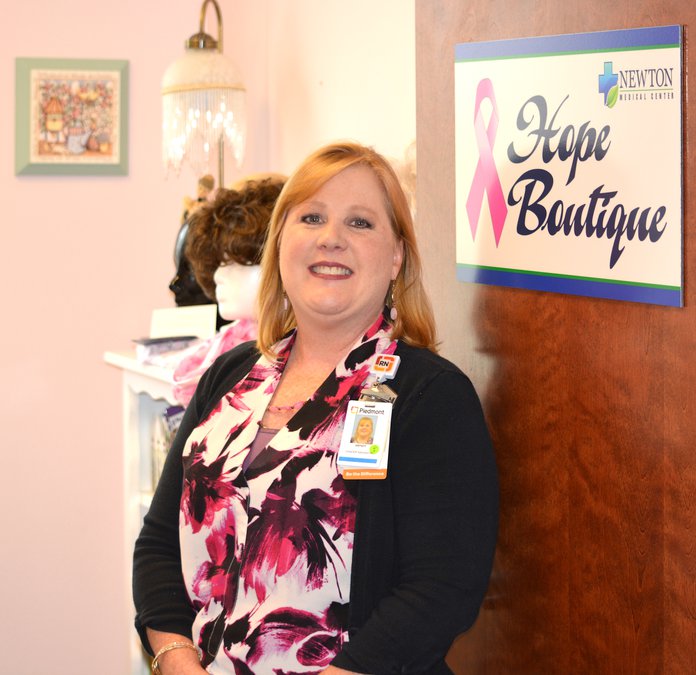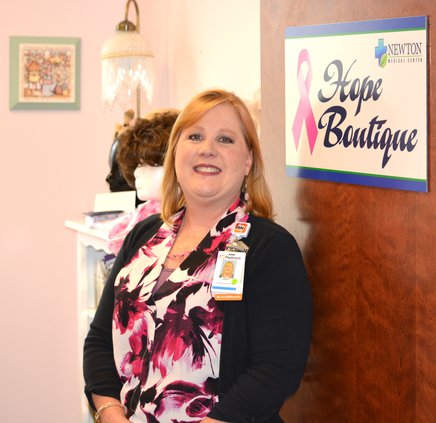For Wendy Hankins, it’s more a calling than a career.
It has to be, considering how Piedmont Newton Hospital’s only cancer navigator found her way from more traditional work as a registered nurse to a position that she describes as a hybrid counselor, caretaker and empathetic friend — one who’s on-call pretty much all the time, by the way.
Hankins comes from a long line of healthcare professionals, including her mother and mother-in-law, and she herself knew she wanted to be a nurse since age 12.
“It was probably all of those dinner table conversations I heard when I was a child that piqued my interest in the medical profession,” Hankins said.
Prior to taking the position as cancer navigator four years ago, she spent 15 years as registered nurse — nine of those at Piedmont Newton — all in the emergency room. But anyone who’s spent any time working in a hospital’s ER knows the kind of physical and emotional grind it can place on a person. Such was the case with Hankins. But her emergency room fatigue was the very thing that set her up to search for a change.
“ER can be tough,” Hankins said. “And sometimes you can get burned out. I started to notice that I didn’t have the passion that I had before, and I felt like I needed a change for both me and my family. So I prayed a lot about it. ER was I all I knew, but I asked God to point me in the right direction.”
The guidance began to show up one day while Hankins was on break in the emergency room. She took the free time to peruse the job board, and that’s when she saw the open position for cancer navigator.
“I don’t know what made me decide to do it that day,” she said. “But when I saw the posting for a cancer navigator, the first thing I thought was, ‘That’s interesting. I wonder what that is.’”
Four years and multiple cancer patients later, Hankins has a much clearer understanding. As a cancer navigator, Hankins’ primary duty is to provide multi-layered support to women who receive a cancer diagnosis.
Many of her stories are about women and their families who would come in for testing scared, but hopeful, only to become temporarily devastated upon hearing the news. But it’s at that moment when Hankins and her support team go into overdrive to make sure the cancer patient and her family know they aren’t alone.
“With navigation, I get to be a nurse, a therapist, an educator, a party planner,” she said with a chuckle. “It’s different than when in the ER. In the ER, it’s fast-paced and you’re moving, moving, moving. Get them stabilized and get them out. Even though you form bonds with patients and see repeat patients, you don’t really have the time to dive into a patient’s life.”
That isn’t an issue in Hankins’ navigator role.
One of her most memorable moments over the last four years is when she had the opportunity to walk through a breast cancer diagnosis with a woman in her early 30s.
“She was in her early 30s,” Hankins said. “Not married, no children and settled into her career. She was about the same age as my children, so that hits home. But her breast cancer diagnosis hit her out of the blue. She was totally devastated. She thought the plan for her life was totally blown apart.”
Hankins gave the young lady her cellphone number — something she does for every patient she connects with — and told her to call or text at any time, whenever she had a hard time dealing with things. For this particular patient, that would be close to bed time.
“She would call or text anywhere between 10 and 11:30 at night. After her day is done and she’s in her pajamas, curled up in bed, that’s when her mind would start working,” Hankins said. “She’d call and have questions, or would just need someone to voice her fears to. I’d stay up and talk with her as long as I needed. And when she got off, she’d hopefully be able to get a good night’s rest.”
But the true highlight in this situation came after this patient’s treatment.
“It was the greatest joy for me to see her at the end of treatment and hear her say, ‘You’re right. My life didn’t have to end. I can still have so many of the things I wanted.’ To be a part of that entire journey from thinking life was over to saying she’s got her life back, that was really amazing.”
Although Hankins is the only cancer navigator at Piedmont Newton, she noted that cancer navigator positions are becoming more common, particularly in larger hospitals.
“It’s grown because patients are pushing for it,” she said.
Some navigators, like Hankins, have the medical expertise from their days in nursing to help patients make sense of the things their doctor are saying and doing. Others are trained as lay navigators — the kind that only cater to the emotional support needs of a cancer patient.
But for Hankins, one of the things that makes what she does so special is the flexibility she has with how she can care for patients. In addition to always being available on call, Hankins can continue supporting a patient even after their treatment takes them away from Piedmont Newton.
When that happens, Hankins can connect the patient to another navigator in another hospital while still, herself, staying in close contact with that patient, providing sort of a “double team” effect.
Beyond the day-to-day interactions with patients, Hankins also finds joy in helping run the Hope Boutique, housed within Piedmont Newton. Hope was started a little over a decade ago by radiology director Lisa McWilliams and Kay Goff, a cancer survivor. The boutique provides wigs, clothing and prosthetics to cancer patients who otherwise can’t afford them.
It wasn’t long after Hankins connected with the boutique that she helped lead it to expand its reach.
“More and more, one of the things I was seeing as a navigator were women needing gas money to get back and forth to appointments,” Hankins said. “They were being forced to make a choice of, ‘Should I pay my co-pay or get gas for my car? Should I fill my prescription or buy groceries for my family?’”
Hankins helped lead the effort to provide funds for cancer patients who needed help with paying mortgages, rent and utilities. Gas and grocery cards were provided, and Hope Boutique was even able to come to the rescue of those who needed cellphone minutes.
“At first I thought cellphone minutes was a bit of a frivolous concern,” she recalled, “until I encountered a patient who asked for cellphone minutes because she was homeless at the time, and the only way she could communicate with her doctors was by that cellphone. It was literally a life line for her. So in those ways, it’s nice to see the reach of Hope Boutique expand.”
Although Hankins finds much fulfillment in her current role, she acknowledges it isn’t without its struggles. She says the most consistently difficult parts of her job involve having to help break the news to a patient with cancer. But it’s almost immediately replaced by her sense of duty to help them get through that initial shock and know that cancer doesn’t have to be the feared death sentence it once was.
“After they hear the diagnosis, I always lead into my talks with them by letting them know we’re going to develop a plan and some processes and steps to get them on the road to treatment,” she said. “I tell them they’ll have to make some pretty big decisions fairly quickly, but that we’ll always do it together. We’ll get them through it.”
Hankins said what gets her through is her faith in God, as well as the memory of walking with her own husband who went through his own bout with a long-term illness.
“He’s ok now,” she said. “But at the time, it was overwhelming. My mom and mother-in-law were nurses, so I had those resources, but it was still overwhelming to see how it changes every aspect of your life, your children’s lives. Just everyone. I remember that, and can’t imagine having to go through that alone, so that motivates me to keep coming back to this day after day.”
Hankins’ heart extends also to those who may not have cancer, but need to remain vigilant regarding their health.
“Get your screenings. Your mammograms, prostate exams, lung screenings, heart screenings,” she says. “They can truly save your life.”
But the one thing she says she wants people — whether current or potential patients — to know most is her availability is not a cliche.
“I’m always here. Anytime, day or night. Things don’t always happen between 9 and 5,” she said. “And please know, you’re not a bother to me. I can’t help if I don’t know there’s a need, so don’t cheat me out of helping you. Anyone who makes a cancer patient feel like they’re a bother, well, that person needs to find different care.”






